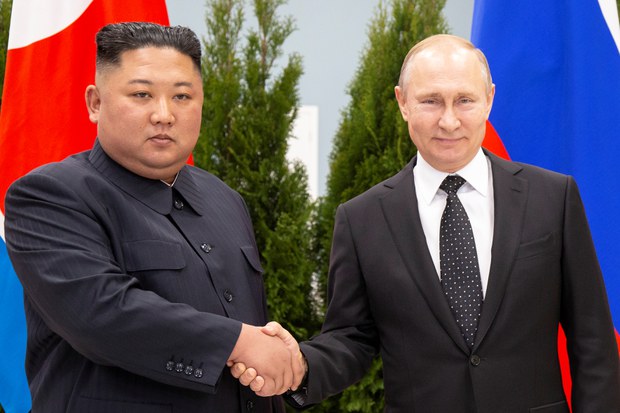North Korea’s Kim Jong Un set to meet Putin this month, officials say
Share

Russian President Vladimir Putin and North Korea’s leader Kim Jong Un shake hands prior to their talks in Vladivostok, Russia, April 25, 2019.
North Korean leader Kim Jong Un is set to meet Russian President Vladimir Putin this month — a development that would complicate the U.S.’s plan to curb both Russian aggression in Ukraine and North Korea’s nuclear ambitions.
“As we have warned publicly, arms negotiations between Russia and the DPRK are actively advancing,” U.S. National Security Council spokeswoman Adrienne Watson said Monday, referring to North Korea by its formal name.
“We have information that Kim Jong Un expects these discussions to continue, to include leader-level diplomatic engagement in Russia,” she added.
A South Korean diplomatic official also confirmed the visit to Radio Free Asia, adding that Seoul was closely monitoring the development with Washington.
The potential meeting comes as North Korea is publicly backing Russia in its aggression against Ukraine. Through its state media, it has reiterated its support of Russia’s aggression, raising suspicion that Pyongyang is also providing ammunition to Moscow.
While the specific agenda for the summit remains unclear, arms trading is expected to be a focal point of the meeting, given Russia’s urgent need for military equipment, and North Korea’s need for diplomatic support amid growing US-South Korea-Japan security cooperation.
Washington issued a stern warning against North Korea last month regarding weapons transactions with Russia. The White House’s national security spokesperson John Kirby said the U.S. was concerned about potential arms deals between Russia and North Korea.
A reinforced alliance between the two may enable North Korea to further advance its nuclear and missile capabilities, leveraging Russian technology and expertise. This could destabilize the delicate balance on the Korean Peninsula and challenge the deterrence capabilities of regional stakeholders like South Korea and Japan.
A united front from North Korea and Russia may embolden their respective stances against the U.S. and its allies, potentially undermining diplomatic efforts and escalating tensions in broader geopolitical arenas.
“It’s worth noting that this meeting took place against the backdrop of escalating tensions between the U.S. and both Russia and China,” Yang Moo-jin, a professor at the University of North Korean Studies in Seoul who had advised the South Korean government over the years, said. “This implies that the Korean Peninsula matter might soon be entangled in a ‘neo-Cold War-like framework’. Essentially, it indicates that leveraging sanctions to denuclearize North Korea is becoming increasingly challenging.
“On a more practical front, North Korea is mostly likely to have needed food supplies, as much as Russia has a military need.”
North Korea had imposed strict COVID restrictions in early 2020, shutting down its borders, including that with its biggest trading partner, China. The North Korean economy contracted for the third straight year in 2022, according to the Bank of Korea. COVID restrictions, compounded by international sanctions, are widely seen to have further depressed the North’s struggling economy.
“A trip to Russia is merely the start, and a China-visit remains a distinct possibility,” Yang added.
China’s potential inclusion in this bloc could further convolute the regional landscape. This scenario seems increasingly plausible, as Russia has officially proposed a joint naval drill with China and North Korea in July, said South Korea’s National Intelligence Service on Monday.
The potential trilateral alliance among the authoritarian nations could counterbalance the influence of the U.S. and its western allies in the Asia-Pacific region and globally. With China’s extensive economic influence, global sanctions or diplomatic pressures against North Korea or Russia could be less effective.
Edited by Elaine Chan and Taejun Kang.







